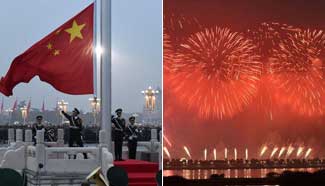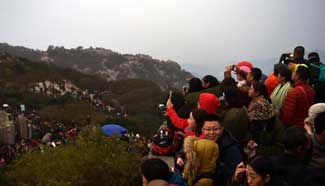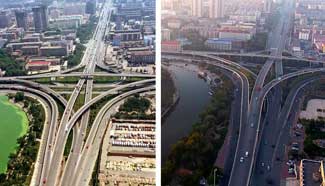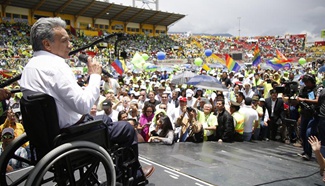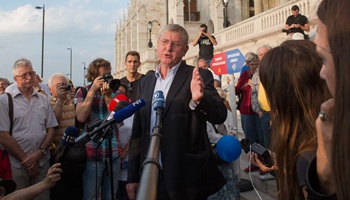BEIJING, Oct. 2 (Xinhua) -- The China-proposed Belt-Road Initiative, which is highly consistent with Mongolia's Steppe Road program, will guide the win-win cooperation between the two countries.
The Belt-Road Initiative refers to the Silk Road Economic Belt and the 21st Century Maritime Silk Road initiative proposed by Chinese President Xi Jinping in 2013. It brings together countries in Asia, Europe and Africa via overland and maritime networks.
The Steppe Road program is designed to boost the Mongolian economy through transborder transportation. It includes infrastructure improvement, such as a new highway to link Russia and China, an electric railway extension of the existing Mongolian railway system and the building of an oil and gas pipeline through Mongolian territory linking Russia and China.
ALIGNMENT WITH MONGOLIA'S PROGRAM
In a meeting with Chairman of the Mongolian People's Party (MPP) Miyegombo Enkhbold during his visit to Mongolia, senior Communist Party of China (CPC) official Liu Yunshan on Saturday called for the implementation of the consensus reached by leaders of the two countries, saying the two sides should boost mutually beneficial trade cooperation and closely align China's Belt-Road Initiative with Mongolia's Steppe Road program.
During the visit of Mongolian President Tsakhiagiin Elbegdorj to China in November 2015, the two countries issued a statement in which both sides said they would actively promote signing a treaty on aligning China's Belt-Road initiative with Mongolia's Steppe Road plan.
In his first official visit to Mongolia in July, Chinese Premier Li Keqiang said the two neighbors are economically complementary to each other and new opportunities in deepening bilateral cooperation have become available.
China stands ready to align its Belt-Road Initiative with Mongolia's Steppe Road program and will start a feasibility study on a free trade pact with Mongolia, Li said.
Li also said China is ready to make new progress with Mongolia in such fields as the processing of farm and pasture products, housing and infrastructure. He suggested the two sides strengthen financial cooperation and expand the currency-swap scale.
Erdenebat said Mongolia will advance cooperation with China in such fields as agriculture, livestock farming, energy, minerals and infrastructure.
Erdenebat welcomed more investment from Chinese firms, adding that Mongolia is positive with starting the feasibility study of a free trade pact with China.
HELPING REVITALIZE MONGOLIAN ECONOMY
Mongolia, a country of 3 million people with an economy of 12 billion U.S. dollars in size, is facing the worst economic crisis since 2009.
The new government led by the ruling MPP is trying to win investor confidence, cut government spending and find solutions to its mounting foreign debt.
The Belt-Road Initiative is expected to help Mongolia overcome the crisis, as many see China -- Mongolia's largest foreign investor and trading partner -- as a major source of foreign direct investment and the largest "market" for its products and services.
"If we can become a part of the Chinese Belt-Road Initiative, receive Chinese technology and know-how, push forward large projects and utilize our geographic advantage, it is not difficult to overcome the crisis," said Banzragch Munkhtuul, director of the Mongolian newspaper Mongolyn Medee.
She said that Mongolia's geographic advantage of locating between Russia and China offers it a chance to boost transit trade, logistics and transportation between these two countries.
About two weeks ago, China's National Development and Reform Commission unveiled the guideline of a China-Mongolia-Russia economic corridor focusing on seven areas, the first of its kind for multilateral cooperation within the framework of the Belt-Road Initiative.
Mongolian Ambassador to China Tsedenjav Sukhbaatar said that the plan to build the economic corridor is a milestone in history and Mongolia is planning to develop special foreign investment zones to attract investment.
Mongolian economists and public figures believe the Belt-Road Initiative will offer more export opportunities for Mongolia to boost its logistics and transportation between China and other countries through its territory.
They say Mongolia has abundant raw materials and mineral resources such as coal, copper and iron ores needed by China, which serves as the basis for mutually beneficial cooperation between the two countries.
Meanwhile, they realize that it is imperative for Mongolia to get rid of heavy dependence on the mining industry and explore new sources of economic growth.
The Belt-Road Initiative is expected to bring new opportunities for the development in areas such as the mining industry, agriculture, stock farming, light industry, tourism and construction of free trade areas.
For instance, Mongolia boasts 73 million heads of livestock farmed by about 200,000 herder households in the vast countryside. Currently, the country's agricultural products lack market access and the government wants to sell them to big consumer markets including China, according to Mongolian media.
However, the country's poor infrastructure and ineffective veterinarian and vaccination services have proven to be a big trade barrier.H Within the framework of the Belt-Road Initiative, these herders face a better prospect of transporting their meat and dairy products to China in a better and fresh condition, media reports said.
Related:
China, Mongolia agree to cement comprehensive partnership
ULAN BATOR, Oct. 1 (Xinhua) -- Senior Communist Party of China (CPC) official Liu Yunshan met separately with Mongolian president and prime minister on Saturday, signalling a strong desire on both sides to cement ties in a comprehensive manner. Full story




